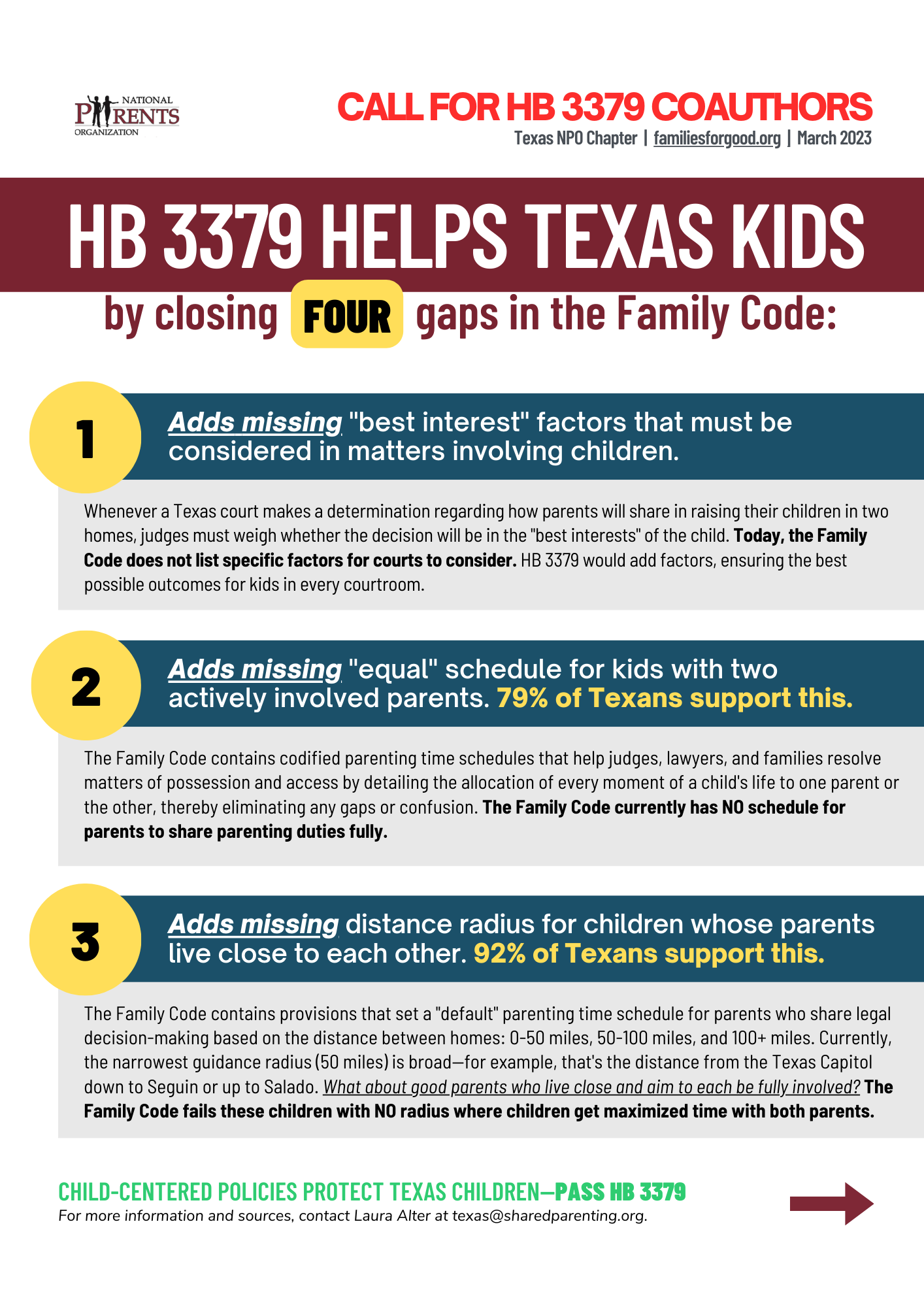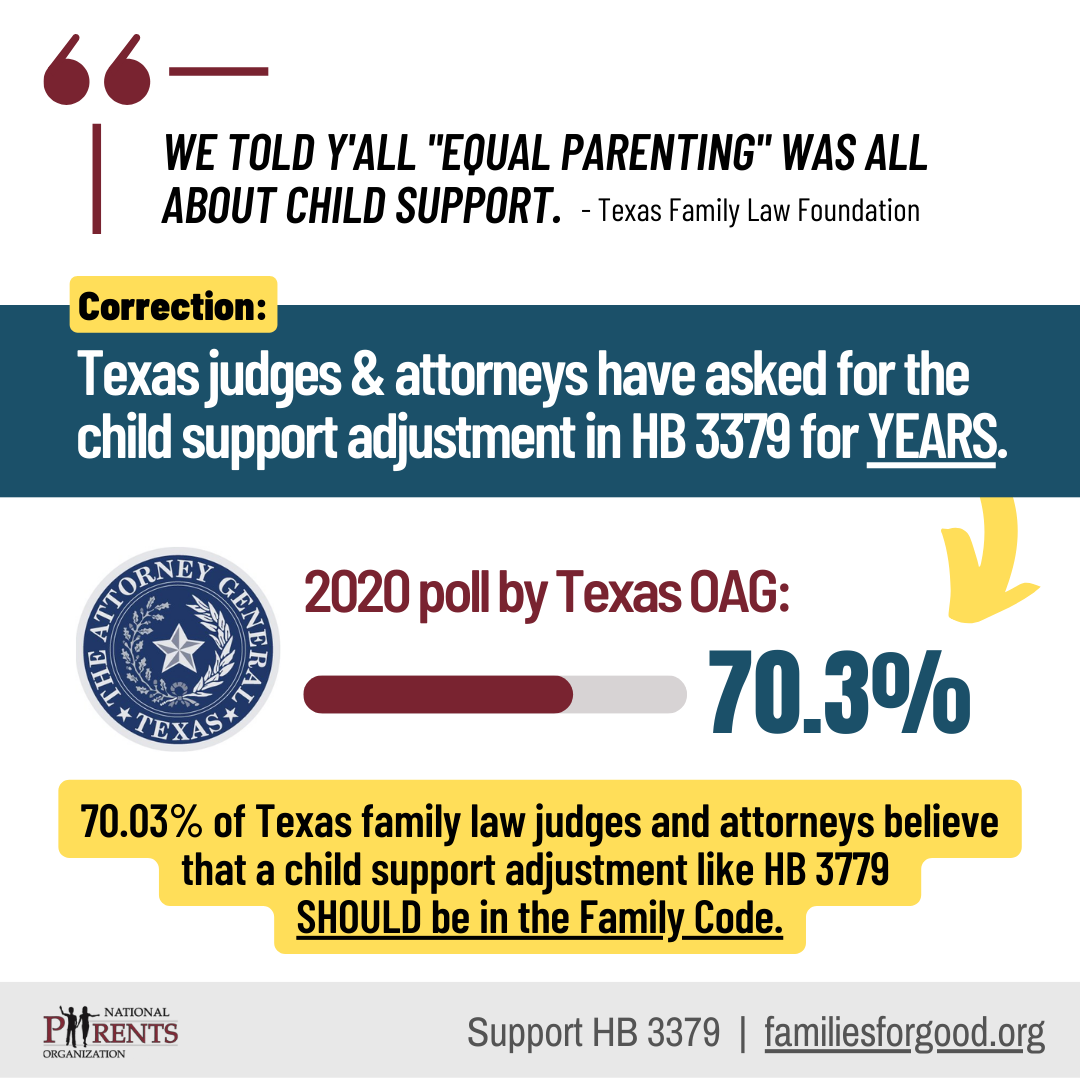
Join us in protecting the rights of Texas children to access both parents when they live apart.
NEW
〰️
NEW 〰️
Shareable Resources
Educate your legislators about child-centered policies that are good for Texas kids by downloading these shareable resources to send by email or post on your social media.
Subscribe for updates on 2023 bill progress and ways to help. Live Zoom updates at 6:30 pm on Wednesdays.
Wednesday call details are sent by email after sign-up.
Key Family Bills Pending in Texas
2023 Texas Child Support Policy Bills
-
For a deeper dive into this topic, click here to read more about where Texas stands nationally among child support policies.
In 1989, Texas legislators ignored the recommendations of a federal child support advisory committee and codified child support guidelines that do not consider the financial resources of both parents nor how much time each parent spends with their child.
Today, 34 years later, the Texas child support guidelines still do not contain these elements in the calculation formula.
Only Texas and Mississippi still do not formulaically consider parents’ incomes or parenting time in any family situation. Nearly every other state adopted some form of these policies prior to 1989 or since.
Over 1.5 million Texas families are served by our state’s child support program today, but our guidelines have not had a meaningful update in over thirty years, leaving Texas far behind nearly every other US state.
Almost 7 in 10 Texas child support obligors are three or more months in arrears. When you consider that the law presumes one parent should be minimized (more than 90% of the time the father is the obligor in Texas) and that our child support guidelines do not formulaically adjust orders to reflect the family situation (meaning that parents who abandon their children pay the same support as parents who parent 50% of the time), it’s clear we urgently need to take action in the 88th session to iteratively modernize our child support guidelines to better support children and their families.
-
Current status: Referred to the Juvenile Justice & Family Issues Committee.
—
In HB 1842, Representative Cook has proposed a public policy statement for the state of Texas with regard to child support. Today, Texas has no guiding statement of this nature in the Family Code.
-
Several Representatives and Senator Hughes have introduced legislation that would order retroactive child support from the date of conception in certain situations.
Read HB 604 (Shaheen) here.
Read HB 532 (Patterson) here.
Read HB 1734 (Leach) here.
Read SB 590 (Hughes) here. -
In this bill, Representative Dutton has introduced language that would require the court to allocate childcare expenses incurred by a parent between both parents “according to the parties' circumstances” when that care is for the purpose of employment or education in anticipation of gainful employment.
-
In this bill, Representative Dutton is proposing a requirement that the Texas Attorney General study the income shares child support model for Texas and propose legislation for the 89th session in 2025.
-
In this bill, Representative Dutton aims to raise the cap of the net resources that are used to calculate child support obligations in Texas to $30,000 per month.
2023 Texas Possession & Access (Custody) Policy Bills
-
In 1989, Texas legislators codified a rebuttable presumption that it’s in the best interest of Texas children to lose most access to one parent when their parents live apart.
Arguably, this winner-take-all false dichotomy has pit Texas parents against each other for the last three decades, with good parents fighting not to be the minimized parent when there is no mutual agreement. When parents fight, children lose every time, and in the end, a child may still lose most access to one good parent.
In the 87th session in 2021, Representative Cook, a board-certified family law attorney, sponsored SB 1936, authored by Senator Hughes, which created a distance radius in which parents who share legal custody (as Joint Managing Conservators - JMC) would presumably follow a schedule that affords a child a 65% increase in time with their parent from the previous default. A victory for Texas kids!
In the 88th session in 2023, Representative Cook continues to advance child-centered modernizations in the Texas Family Code, including the addition of a more narrow radius in which “equal” parenting time would be the default schedule for JMC parents, in addition to other key bills listed below.
-
In HB 3379, Representative Cook proposes a new distance radius that has a default of an “equal” parenting time schedule for parents who share legal custody (Joint Managing Conservators), giving children maximized access to both of their parents. This builds on the existing parenting time schedules in the Family Code that are based on distance between parents. Currently, the Family Code does not include an “equal” schedule option for Texas parents, and this bill would close that gap.
-
In this bill, Senator Middleton aims to set a rebuttable presumption that parents named Joint Managing Conservators (sharing legal decision-making responsibilities) would have equal rights to possession and access to the child. HB 3379 is related, but offers a 20-miles radius where this is the default schedule and provides for schedule options.
-
Current status: Referred to the Juvenile Justice & Family Issues Committee.
—
In HB 1197, Representative Cook has provided a list of factors that must be considered when determining the issues of conservatorship and possession of and access to the child when parents live apart. There are currently NO listed factors in the Family Code that must be considered when making these complex decisions, leaving it up to varying judicial discretion and priorities. The bill aims to ensure that “child’s best interest” has clear definition used in all Texas family courts.
-
Current status: Referred to the Juvenile Justice & Family Issues Committee.
—
In HB 1120, Representative Cook updates the factors that must be considered when rendering orders for the possession of a child under three years old.
-
In HB 2688, Representative Cook aims to protect parents’ rights in the modification of certain orders in a suit affecting the parent-child relationship, requiring findings that a JMC parent remaining as such would significantly impair the child's physical health or emotional development in order to be removed.
-
In this bill, Representative Ramos aims to update the Standard Possession Order for parents who reside within 100 miles of each other to include Thursday possession for the non-custodial parent from the time school lets out on Thursdays until school resumes on Friday morning, unless overnight possession is not in the best interest of the child. Currently, parents in this radius have a default schedule that includes 6-8 pm on Thursday nights during the school year.
2023 Texas Interference with Child Custody (ICC) Policy Bills
-
Interference with child custody occurs when a parent or other individual violates the terms of a court order relating to possession and access of a child by not allowing the other parent to exercise their parenting time. This is sometimes referred to as parental kidnapping.
Texas Penal Code, § 25.03 (“Interference with Child Custody”) dictates that interference with child custody is a felony. However, Texas law enforcement does not typically enforce it as a felony, often citing it as a “civil matter” despite its felony designation.
This means that a parent who is denied their court-ordered access to their child has limited or no recourse to see their child.
This type of denied access could occur just one time in a child’s life, or it could occur during every period of possession over a period of years—the limited enforcement options are the same.
Further, if a non-custodial parent is denied court-ordered access by the custodial parent, they are required to make child support payments ongoing or face jail time, loss of license, and fines. This is because Texas District Attorneys strongly enforce Penal Code, § 25.05 (“Criminal Nonsupport”), with the backing of the Texas Attorney General, which is the agency charged with managing our child support program.
In the 88th session, NPO Texas is supporting several legislators in advancing child-centered policies that ensure Texas children are able to access both of their parents when they live apart, including the enforcement of Texas Penal Code, § 25.03.
-
Representative Cook and Senator Paxton have filed identical bills in the House and Senate that would require Texas courts to order additional periods of possession when a parent is prevented from having their court-ordered possession of a child. This would apply when a parent interferes with court-ordered access and when DFPS completes an investigation that did not result in a finding of abuse or neglect.
-
Current status: SB 431 has been referred to State Affairs.
—
Representative Cook and Senator Middleton have filed identical bills in the House and Senate. This bill would authorize a municipality or county to adopt an ordinance or order that imposes a civil penalty of not more than $500 for engaging in conduct described by Section 25.03, Penal Code (Interference with Child Custody).
-
In these bills, Representative Vasut aims to remove the statute of limitations for the prosecution of interference with child custody under Section 25.03, Penal Code (Interference with Child Custody).

NPO Texas is working to address over 30 years of delayed public policy modernizations for Texas families.
Protecting every child's right to the love and care of both parents after separation or divorce.

